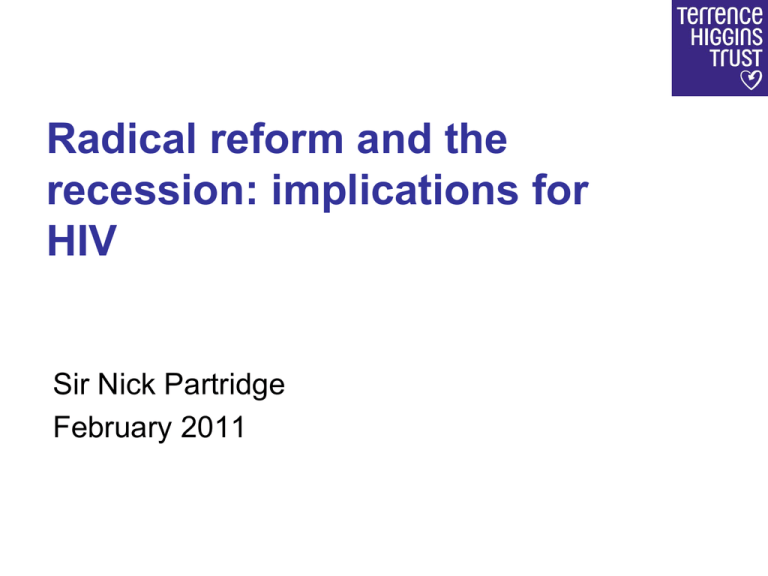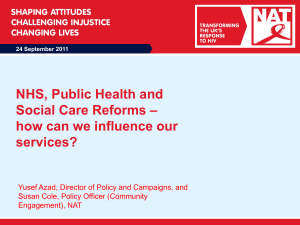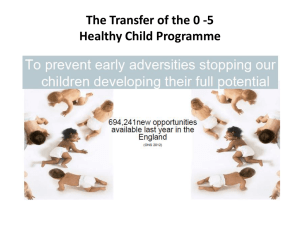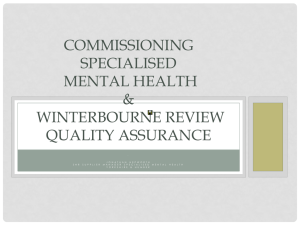
Radical reform and the
recession: implications for
HIV
Sir Nick Partridge
February 2011
Outline
Liberating the NHS: 'most radical reorganisation for 60
years'
Welfare reform: 'most radical shake-up for 60 years'
Localism: ‘most radical shift in power to communities and
individuals for 60 years’
Public spending cuts: ‘most radical reductions for 60
years’
Implications for NHS, Local Authorities, Voluntary Sector
Implications for PWHIV
Legal aid cuts will make unfair decisions harder to
challenge
Liberating the NHS –
putting patients first
Shared decision making to be the norm: no decision
about me without me
An information revolution:
Patient access to information to make choices about
their care and increased control over their records
Patient choice of any provider, consultant-led team,
GP practice and treatment
Patients to rate hospitals and clinical departments on
quality of care
System focus on personalised care
Liberating The NHS - providers
Move to deliver all NHS provided services through
Foundation Trusts (as social enterprise)
Expansion of role of other social enterprise providers,
voluntary organisations and private sector providers on a
level playing field
Establishment of ‘any willing provider’ policy to increase
consumer choice
Money follows the patient, with payment reflecting
outcomes and activity
Liberating the NHS:
Commissioning
Replacing 150 PCTs with up to 400 GP led
commissioning consortia, responsible for spending about
80% of NHS budget
GP and specialist services to be commissioned by
National Commissioning Board
Public Health to be commissioned by Local Authorities,
within a ringfenced allocation (between 2 & 4% of NHS
budget)
Local Authorities to have responsibility for coordinating
health, social care and public health commissioning within
their areas
Healthy Lives, Healthy People
The New Approach aims to be:
representative – owned by communities and shaped
by their needs
resourced –with ring-fenced funding and incentives
to improve
rigorous – professionally-led, focused on evidence,
efficient and effective
resilient – strengthening protection against current
and future to health
and will focus on improving the health of the poorest
fastest
Healthy Lives, Healthy People
Public Health England – the national public health
service
Directors of Public Health transfer from PCTs to local
government, working across education, health,
transport, leisure and communities through new
health and wellbeing boards
Ring-fenced budget, and a new health premium
rewarding progress on key outcomes and tackling
health inequalities
Top-down targets will be replaced by a new strategic
outcomes framework
Public Health Outcomes Framework
Three specific sexual health outcomes are proposed
in the Public Health Outcomes Framework:
Proportion of persons presenting with HIV at a late
stage of infection
Under 18 conception rate
Chlamydia diagnosis rates per 100,000 young
adults aged 15-24
Vitally important that you support these by responding
to Healthy Lives, Healthy People: Transparency in
Outcomes by 31st March
Question 7: We need to arrive at a smaller set of
indicators. Which would you rank as the most
important?
HIV – Future Commissioning
Structures
Specialist HIV treatment: NHS Commissioning Board
National HIV prevention: Public Health England
Integrated sexual health services: Local Authorities
Risk of fragmentation
More complex for pooling budgets and cross border
working
No role for GP Consortia
Implications: HIV
Avoids handing commissioning to GPs who can be
inexperienced in dealing with HIV
At odds with Long Term Condition Management and
need for greater primary care involvement HIV
More complicated arrangement for commissioning HIV
services provided from GUM
Local Authorities responsible for commissioning sexual
health and HIV testing
Sexual health services cost £700- £750 million: up to
20% of the ring-fenced budget for Public Health
Implementation
New NHS architecture to be in place by 2013
Key milestones:
- First GPC in place from April 11
- NCB & Monitor new powers April 2012
- PCTs and SHAs abolished from 2013 onwards
Pre-emptive strike on management costs with 45%
cutbacks at PCT & SHA level
Consolidation of PCTs as current structures become
unsustainable
Impact on THT
Current budget £22 million
25% voluntary income, 75% statutory income
Over 200 contracts with PCTs, LAs and DH
From April, voluntary income up 12%, statutory
income down 32%
Need to make £5 million cuts
Economic environment
• Spending Review 2010: £81bn cuts package
• Reduction of £20bn in NHS spending
• Reduction of 25%+ in Local Government income
• Reduction of £18bn in welfare spending
• Unemployment up to 2.49 million (7.9%)
Welfare Reform
Introduction of the Universal Credit
Reform of DLA in to Personal Independence Payment,
with target of 20% reduction in DLA spend. Claimants will
face a greater burden of assessment and reporting
Introduction of Employment and Support Allowance after one year people will go onto a much lower rate of
support
Increasing the age threshold for the Shared Room Rate
from 25 to 35 – confidentiality and disclosure issues for
PWHIV under 35
Housing benefit cap - some PWHIV, particularly in
London, may have to leave their homes
What do you need? 2007-08
Sigma Research
47% were not in paid employment
Women were worst affected with 60% not in paid
employment
Almost half (48%) lived on less than £15,000 per year
Over 35% felt that housing and living conditions had
worsened in the last year
Amongst those experiencing money problems who
received help, the largest proportion (34%) received it
from an HIV organisation
50 Plus - ageing and HIV
THT 2010
One in ten respondents had an income of less than
£96 a week, or £5,000 a year
This rose to more than one in four among the black
African women
50% were living on under £15,000 a year
45% said that they sometimes or never had enough
money to cover basic needs
10% never had enough to cover basic needs. This
included half of all the black African women
respondents
Respond to Healthy Lives, Healthy People: Transparency
in Outcomes by 31st March, supporting the three HIV and
sexual health outcome indicators
Sign up to Shout Loud at www.shoutloud.org.uk
Sign up as THT campaigners at www.tht.org.uk
Sign up to the HIV activists network at www.nat.org.uk
Sign up at www.myhiv.org.uk
Thank you!
nick.partridge@tht.org.uk






